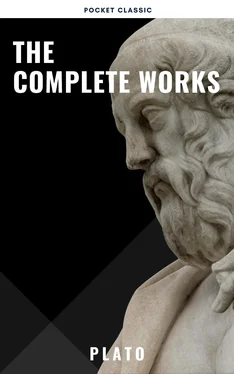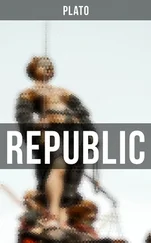To this we agreed, and proceeded on our way until we reached the vestibule of the house; and there we stopped in order to conclude a discussion which had arisen between us as we were going along; and we stood talking in the vestibule until we had finished and come to an understanding. And I think that the door-keeper, who was a eunuch, and who was probably annoyed at the great inroad of the Sophists, must have heard us talking. At any rate, when we knocked at the door, and he opened and saw us, he grumbled: They are Sophists—he is not at home; and instantly gave the door a hearty bang with both his hands. Again we knocked, and he answered without opening: Did you not hear me say that he is not at home, fellows? But, my friend, I said, you need not be alarmed; for we are not Sophists, and we are not come to see Callias, but we want to see Protagoras; and I must request you to announce us. At last, after a good deal of difficulty, the man was persuaded to open the door.
When we entered, we found Protagoras taking a walk in the cloister; and next to him, on one side, were walking Callias, the son of Hipponicus, and Paralus, the son of Pericles, who, by the mother’s side, is his half- brother, and Charmides, the son of Glaucon. On the other side of him were Xanthippus, the other son of Pericles, Philippides, the son of Philomelus; also Antimoerus of Mende, who of all the disciples of Protagoras is the most famous, and intends to make sophistry his profession. A train of listeners followed him; the greater part of them appeared to be foreigners, whom Protagoras had brought with him out of the various cities visited by him in his journeys, he, like Orpheus, attracting them his voice, and they following (Compare Rep.). I should mention also that there were some Athenians in the company. Nothing delighted me more than the precision of their movements: they never got into his way at all; but when he and those who were with him turned back, then the band of listeners parted regularly on either side; he was always in front, and they wheeled round and took their places behind him in perfect order.
After him, as Homer says (Od.), ‘I lifted up my eyes and saw’ Hippias the Elean sitting in the opposite cloister on a chair of state, and around him were seated on benches Eryximachus, the son of Acumenus, and Phaedrus the Myrrhinusian, and Andron the son of Androtion, and there were strangers whom he had brought with him from his native city of Elis, and some others: they were putting to Hippias certain physical and astronomical questions, and he, ex cathedra, was determining their several questions to them, and discoursing of them.
Also, ‘my eyes beheld Tantalus (Od.);’ for Prodicus the Cean was at Athens: he had been lodged in a room which, in the days of Hipponicus, was a storehouse; but, as the house was full, Callias had cleared this out and made the room into a guest-chamber. Now Prodicus was still in bed, wrapped up in sheepskins and bedclothes, of which there seemed to be a great heap; and there was sitting by him on the couches near, Pausanias of the deme of Cerameis, and with Pausanias was a youth quite young, who is certainly remarkable for his good looks, and, if I am not mistaken, is also of a fair and gentle nature. I thought that I heard him called Agathon, and my suspicion is that he is the beloved of Pausanias. There was this youth, and also there were the two Adeimantuses, one the son of Cepis, and the other of Leucolophides, and some others. I was very anxious to hear what Prodicus was saying, for he seems to me to be an all-wise and inspired man; but I was not able to get into the inner circle, and his fine deep voice made an echo in the room which rendered his words inaudible.
No sooner had we entered than there followed us Alcibiades the beautiful, as you say, and I believe you; and also Critias the son of Callaeschrus.
On entering we stopped a little, in order to look about us, and then walked up to Protagoras, and I said: Protagoras, my friend Hippocrates and I have come to see you.
Do you wish, he said, to speak with me alone, or in the presence of the company?
Whichever you please, I said; you shall determine when you have heard the purpose of our visit.
And what is your purpose? he said.
I must explain, I said, that my friend Hippocrates is a native Athenian; he is the son of Apollodorus, and of a great and prosperous house, and he is himself in natural ability quite a match for anybody of his own age. I believe that he aspires to political eminence; and this he thinks that conversation with you is most likely to procure for him. And now you can determine whether you would wish to speak to him of your teaching alone or in the presence of the company.
Thank you, Socrates, for your consideration of me. For certainly a stranger finding his way into great cities, and persuading the flower of the youth in them to leave company of their kinsmen or any other acquaintances, old or young, and live with him, under the idea that they will be improved by his conversation, ought to be very cautious; great jealousies are aroused by his proceedings, and he is the subject of many enmities and conspiracies. Now the art of the Sophist is, as I believe, of great antiquity; but in ancient times those who practised it, fearing this odium, veiled and disguised themselves under various names, some under that of poets, as Homer, Hesiod, and Simonides, some, of hierophants and prophets, as Orpheus and Musaeus, and some, as I observe, even under the name of gymnastic-masters, like Iccus of Tarentum, or the more recently celebrated Herodicus, now of Selymbria and formerly of Megara, who is a first-rate Sophist. Your own Agathocles pretended to be a musician, but was really an eminent Sophist; also Pythocleides the Cean; and there were many others; and all of them, as I was saying, adopted these arts as veils or disguises because they were afraid of the odium which they would incur. But that is not my way, for I do not believe that they effected their purpose, which was to deceive the government, who were not blinded by them; and as to the people, they have no understanding, and only repeat what their rulers are pleased to tell them. Now to run away, and to be caught in running away, is the very height of folly, and also greatly increases the exasperation of mankind; for they regard him who runs away as a rogue, in addition to any other objections which they have to him; and therefore I take an entirely opposite course, and acknowledge myself to be a Sophist and instructor of mankind; such an open acknowledgement appears to me to be a better sort of caution than concealment. Nor do I neglect other precautions, and therefore I hope, as I may say, by the favour of heaven that no harm will come of the acknowledgment that I am a Sophist. And I have been now many years in the profession—for all my years when added up are many: there is no one here present of whom I might not be the father. Wherefore I should much prefer conversing with you, if you want to speak with me, in the presence of the company.
As I suspected that he would like to have a little display and glorification in the presence of Prodicus and Hippias, and would gladly show us to them in the light of his admirers, I said: But why should we not summon Prodicus and Hippias and their friends to hear us?
Very good, he said.
Suppose, said Callias, that we hold a council in which you may sit and discuss.—This was agreed upon, and great delight was felt at the prospect of hearing wise men talk; we ourselves took the chairs and benches, and arranged them by Hippias, where the other benches had been already placed. Meanwhile Callias and Alcibiades got Prodicus out of bed and brought in him and his companions.
When we were all seated, Protagoras said: Now that the company are assembled, Socrates, tell me about the young man of whom you were just now speaking.
Читать дальше












